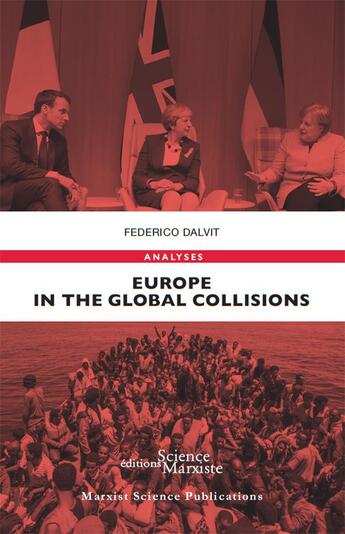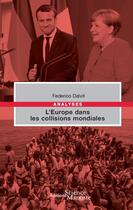Résumé:
April 1998, «proletarian opposition to European imperialism and unitary imperialism»: for twenty years this has been the watchword of the masthead of our newspaper, «Lotta Comunista». It contains three strategic indications.
First of all the imperialist content of the European construction, the... Voir plus
April 1998, «proletarian opposition to European imperialism and unitary imperialism»: for twenty years this has been the watchword of the masthead of our newspaper, «Lotta Comunista». It contains three strategic indications.
First of all the imperialist content of the European construction, the ultimate driving force behind which is to be found in the world contention and the reaction to the emergence of Asia and China in particular. This theoretical assumption indicates European unity as imperialist scission, i.e. it means the unification of Europe is not an attenuation of the inter-power tensions, but an exacerbation of the division and clash at a global level. The ideology of a benign Europe tells of a European Community born in the '50s as an answer to the self-destruction of the Old Continent in two world wars. On the contrary, the reality of the contention shows an EUin search of the powers and tools to create a power Europe capable of negotiating on a par with the United States and to withstand the impact of the Chinese irruption. If the EU has removed inter-State war and violence from inside itself, it will be to project its power externally.
Secondly, opposition to European imperialism, i.e. to the «main enemy at home»in the motto of the internationalists in 1914, presupposes struggle not only against the European Union but also against the national shells brandished by capital in the centuries of bourgeois rise and entrenchment up to the imperialist twentieth century, under whose banners Europe was destroyed in the two world wars between 1914 and 1945. Only communist internationalism, with its October 1917 assault, was able to oppose that bloodbath.
Today the return to the myths of the nation and the sovereignism of the small homelands is idle chitchat in the face of such epochal collisions as the emergence of China or the irruption of the migration flows, but this does not mean it does not cause damage. Besides being the receptacle of the more reactionary and xenophobic ideologies, those fearful ideologies of the petty bourgeoisie and the intermediate strata oppose the unity of the labour market on a continental scale.
The free circulation of wage earners in the EU, with the room it offers the unity of the proletariat in Europe, is an objective and unprecedented advantage from the viewpoint of relations among the class forces: it needs to be defended against the sovereignist illusions of every stripe, whether they regard the recycling of the old reactionary garbage or the cunning discovery of a left-wing sovereignism on the part of a maximalism in search of electoral gimmicks.
Lastly, class opposition to the global domination of capital is contained in the concept of unitary imperialism: in the unity-scission dialectic - powers fighting among themselves but united in ensuring class domination -, imperialist development has brought with itself a huge increase in the world proletariat.
Two billion wage earners: this is the strength of our class at a global level; against the ideologies benumbed by fear of the new political cycle, its vanguard workers must think European in order to look at the world.
Donner votre avis









